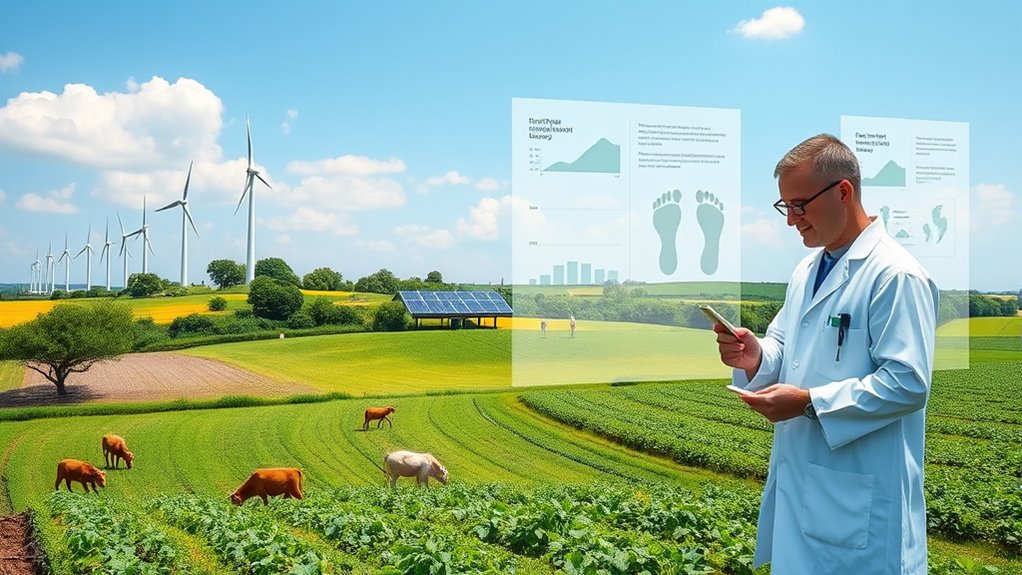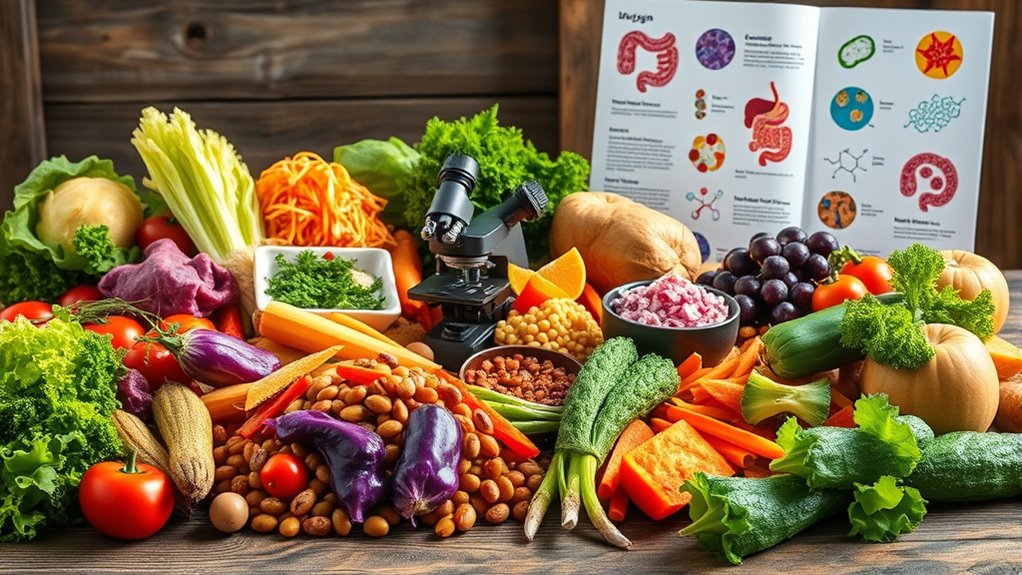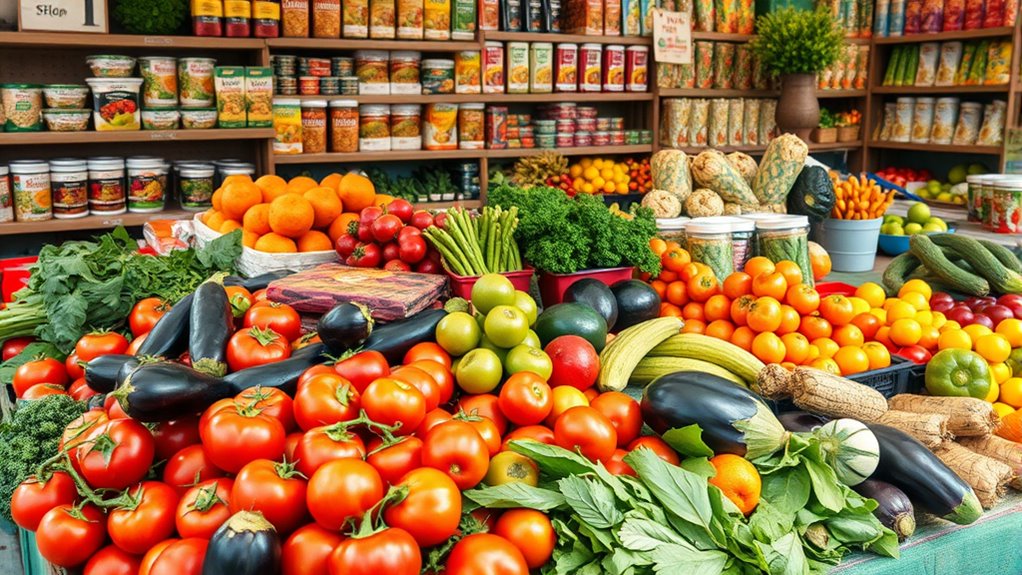Many common criticisms of veganism are based on misconceptions. Scientific evidence shows that plant-based diets provide adequate protein, especially when varied and well-planned, and can even support cardiovascular health and prevent chronic diseases. Vegan diets also use land more efficiently and reduce environmental impact. Ethical concerns about animal suffering are addressed by choosing sustainable practices, while cost and food variety are more accessible than you might think. To uncover the truths behind these debates, continue exploring the science behind vegan nutrition and sustainability.
Key Takeaways
- Plant-based diets can provide all essential amino acids through varied, plant sources, making supplementation generally unnecessary.
- Vegan diets lower heart disease risk by reducing cholesterol, blood pressure, and inflammation, supported by extensive scientific research.
- Proper planning ensures adequate intake of nutrients like B12, iodine, and vitamin D via fortified foods and supplements.
- Combining grains and legumes creates complete proteins, addressing concerns about protein adequacy in vegan diets.
- Environmental benefits include reduced land use, greenhouse gases, and resource consumption compared to animal-based diets.
Debunking Myths About Protein Intake on a Vegan Diet

Many people believe that vegans can’t get enough protein, but this is a common misconception. Plant protein sources like beans, lentils, tofu, and quinoa provide ample amino acids necessary for your health. While some worry about amino acid completeness, you can easily combine different plant foods to guarantee you get all essential amino acids. For example, pairing grains with legumes creates a complete protein profile. Additionally, many plant-based foods naturally contain a broad spectrum of amino acids, making supplementation unnecessary for most people. Consuming a varied diet helps meet your daily protein needs without animal products. With careful planning, you can confidently get enough protein from plant sources, debunking the myth that vegan diets lack sufficient amino acids or protein quality. Plant-based proteins are a versatile and effective way to meet nutritional requirements, further supporting the viability of vegan diets.
Environmental Impact: Does Veganism Truly Reduce Carbon Footprint?

You might assume veganism always lowers land use and emissions, but the reality is more complex. Some plant-based foods require significant resources, and emissions can vary depending on production methods. It’s worth examining whether switching diets truly makes a difference for the environment. Additionally, understanding the environmental impact of different foods can help individuals make more informed choices. Factors such as transportation, farming practices, and processing methods all influence the overall carbon footprint, which can sometimes offset the benefits of a plant-based diet. Recognizing the technology used in food production can further clarify how different approaches affect environmental outcomes. Implementing fraud detection techniques in supply chains could also improve transparency and resource efficiency in food production processes.
Land Use Efficiency
While adopting a vegan diet is often promoted as an environmentally friendly choice, its actual land use efficiency warrants closer examination. Veganism can considerably impact land resources, especially when considering urban planning and crop yield. To illustrate:
- Growing plant-based foods generally requires less land than raising animals, freeing space for other uses.
- Crops like grains and legumes produce higher yields per hectare, making efficient use of available land.
- Urban planning can optimize land use by integrating plant-based agriculture, reducing sprawl and preserving natural habitats.
These factors suggest that vegan diets may use land more efficiently, but the overall impact also depends on farming practices and regional considerations. Efficient land use ultimately supports sustainable development goals.
Emissions Comparison
Vegan diets often get praised for their lower environmental impact, but the actual effect on carbon emissions can be more complex than it appears. While reducing livestock impact generally lowers carbon emissions, the overall reduction depends on many factors, such as farming practices and supply chains. Some plant-based foods require substantial energy and resources, which can offset some benefits. Additionally, emissions from transportation, processing, and packaging contribute to the total footprint. Studies show that shifting toward vegan diets tends to decrease carbon emissions, but the extent varies based on regional practices and dietary choices. Moreover, research supports 16PF measures that individual behaviors and preferences influence environmental impact significantly. So, while veganism can profoundly reduce your personal carbon footprint, understanding the full emissions comparison reveals a nuanced picture influenced by multiple environmental factors.
Addressing Concerns About Nutritional Deficiencies

Concerns about nutritional deficiencies often arise because some essential nutrients are less abundant in plant-based diets. However, these concerns can be effectively addressed through practical strategies. First, vitamin supplementation ensures you get enough B12, which is primarily found in animal products. Second, food fortification adds nutrients like iodine and vitamin D to plant-based foods, making them more nutritious. Third, including a variety of nutrient-dense foods—such as legumes, nuts, seeds, and leafy greens—can help meet your needs naturally. Additionally, incorporating aesthetic wall organization solutions can help create a motivating environment for healthy eating. Proper storage methods, such as airtight containers, can also help preserve the freshness and nutritional value of your juices and foods. Moreover, choosing locally sourced produce supports sustainable practices and often retains higher nutritional content. Utilizing soil health practices can further enhance the nutrient density of plant foods by promoting richer mineral content in the soil. Furthermore, selecting high-quality organic produce may increase the levels of beneficial phytochemicals and nutrients in your diet. By combining these approaches, you can maintain excellent health without animal products. This proactive approach dispels common worries, showing that with proper planning, a vegan diet can be fully nutritious and balanced.
The Ethical Argument: Are Vegan Choices More Compassionate?

The ethical appeal of veganism centers on reducing animal suffering and promoting compassion toward all living beings. By making compassionate choices, you consider the ethical considerations of how animals are treated in food production. Some argue that veganism is inherently more compassionate because it avoids causing harm. However, others believe that ethical choices depend on context and intentions. To explore this, consider the following:
| Ethical Consideration | Impact on Animal Welfare |
|---|---|
| Factory Farming | High harm, unnecessary suffering |
| Sustainable Farming | Reduced harm, focus on humane practices |
| Cultural Traditions | Varies, ethical debate over customs |
| Personal Responsibility | Varies based on awareness and effort |
| Economic Factors | Access and affordability influence choices |
Ultimately, whether vegan choices are more compassionate depends on how you weigh these ethical considerations. Additionally, understanding animal welfare standards and practices can influence your ethical decisions around diet and lifestyle. Recognizing the importance of sustainable farming methods can also help align ethical choices with environmental concerns. Moreover, considering cultural traditions and their role in dietary choices can provide a broader perspective on ethical decision-making. Engaging with ethical frameworks can further deepen your understanding of compassion in dietary choices. Furthermore, exploring alternative protein sources can offer sustainable and ethical options that align with compassionate values.
Examining the Cost and Accessibility of Plant-Based Nutrition

While ethical considerations often focus on animal welfare, practical factors like cost and accessibility substantially influence whether plant-based diets are feasible for many people. Economic affordability is key, as some believe plant-based foods are expensive. To clarify, consider these points:
- Fresh produce and legumes are often cheaper than processed animal products.
- Food accessibility varies by region, with urban areas typically offering more plant-based options.
- Community programs and local markets can improve access to affordable plant-based foods.
- The variety of materials available can also influence the affordability and appeal of plant-based diets for consumers.
- Recognizing the importance of food distribution systems, communities can foster support networks that promote access and affordability of plant-based options.
- Additionally, understanding cost differences helps dispel misconceptions about the expense of maintaining a plant-based diet.
Despite perceptions, many plant-based staples are cost-effective and widely available. Addressing economic affordability and food accessibility helps ensure that more people can adopt sustainable, healthy plant-based diets without financial barriers.
The Role of Veganism in Preventing Chronic Diseases

Switching to a vegan diet can markedly lower your risk of heart disease by reducing cholesterol and blood pressure. It may also help you prevent type 2 diabetes through improved insulin sensitivity. Considering these benefits, veganism plays a crucial role in controlling and avoiding chronic illnesses.
Reduced Cardiovascular Risks
Numerous studies consistently show that adopting a vegan diet can considerably lower your risk of developing cardiovascular diseases. This is partly due to your increased intake of plant-based antioxidants, which combat inflammation and oxidative stress. Additionally, vegan omega 3s from sources like flaxseeds and walnuts help reduce blood triglycerides and improve arterial health. To visualize the impact:
- You consume more fruits and vegetables rich in antioxidants.
- You replace saturated fats with healthier plant fats, lowering cholesterol.
- You incorporate vegan omega 3s, supporting heart function and reducing inflammation.
These dietary shifts collectively promote healthier arteries, decrease blood pressure, and diminish the risk of heart disease. Embracing a vegan diet actively contributes to long-term cardiovascular health through nutrient-rich, anti-inflammatory foods.
Lower Diabetes Incidence
Adopting a vegan diet not only benefits your heart but also considerably lowers your risk of developing type 2 diabetes. Research shows that a vegan lifestyle supports diabetes prevention by improving insulin sensitivity and reducing blood sugar levels. Plant-based diets tend to be high in fiber, antioxidants, and healthy fats, all of which help regulate glucose metabolism. By avoiding processed foods and animal products, you decrease saturated fat intake, which is linked to insulin resistance. This shift can lead to better weight management and lower inflammation, both vital for reducing diabetes risk. Embracing a vegan lifestyle makes it easier to maintain blood sugar levels within healthy ranges, ultimately lowering your chances of developing type 2 diabetes and supporting overall health.
Impact of Veganism on Gut Health and Digestion

Vegan diets can substantially influence gut health and digestion, as they often involve increased intake of fiber and plant-based nutrients. This shift impacts your gut microbiota, encouraging beneficial bacteria growth. As a result, your digestion efficiency improves because these microbes help break down complex fibers and produce nutrients. Here’s what happens:
Vegan diets boost gut bacteria, improve digestion, and promote overall gut health through increased fiber intake.
- You experience enhanced gut microbiota diversity, supporting overall digestive health.
- Fiber-rich foods promote regular bowel movements and reduce constipation.
- Increased fermentation by gut bacteria produces short-chain fatty acids, which nourish your gut lining and reduce inflammation.
Clarifying Misconceptions About Vegan Food Availability and Variety

Many people assume that going vegan means sacrificing variety and accessibility when it comes to food choices. In reality, vegan food diversity and plant-based meal options are expanding rapidly, making it easier than ever to enjoy a wide range of delicious meals. You can find vegan versions of traditional dishes, international cuisines, and innovative creations that cater to all tastes. To illustrate, consider this table:
| Meat-based Dish | Vegan Alternative | Cuisine Type |
|---|---|---|
| Cheeseburger | Veggie burger with plant cheese | American |
| Chicken Curry | Tofu or jackfruit curry | Indian |
| Beef Tacos | Lentil or mushroom tacos | Mexican |
| Fish and Chips | Banana blossom or tofu fish | British |
| Spaghetti Carbonara | Mushroom and cashew sauce | Italian |
This variety proves vegan food accessibility is constantly growing.
Frequently Asked Questions
Can Vegans Meet All Their Essential Nutrient Requirements Without Animal Products?
You can meet all your essential nutrient needs without animal products, but it requires careful planning. Nutrient bioavailability varies, so you might need to include fortified foods or supplements, especially for vitamin B12, iron, and omega-3s. By diversifying your plant-based diet and considering supplement necessity, you guarantee you’re getting enough nutrients. With the right approach, a vegan diet can be nutritionally complete and healthful.
How Does Veganism Compare to Other Diets in Reducing Environmental Impact?
When comparing diets, you’ll find veganism generally has a smaller environmental footprint than omnivorous diets. It uses less land and water, reduces greenhouse gas emissions, and decreases deforestation caused by livestock farming. By choosing plant-based foods, you actively lower your impact on the planet, making your dietary choices more sustainable. Overall, veganism promotes better land use and helps protect natural resources for future generations.
Are Plant-Based Foods Sufficient for Athletes and Active Individuals?
Did you know plant-based foods can fully support athletes and active individuals? You can achieve protein adequacy and optimize muscle recovery with a variety of plant proteins like beans, lentils, tofu, and quinoa. While it might seem surprising, many athletes thrive on vegan diets. By paying attention to diverse sources and proper planning, you guarantee your body gets the nutrients needed to perform at its best.
What Are the Long-Term Health Effects of a Vegan Diet?
You might wonder about the long-term health effects of a vegan diet. Research shows it can improve nutrient absorption and positively influence your gut microbiome, promoting better digestion and immunity. However, you should plan carefully to prevent deficiencies in nutrients like B12, iron, and omega-3s. Staying mindful of your diet’s balance helps ensure sustained health benefits, supporting your overall well-being over time.
Is Vegan Food Accessible and Affordable for Low-Income Populations?
Imagine a world where vegan food is as rare as a unicorn in a food desert. Sadly, for low-income populations, food deserts and price barriers make fresh, affordable vegan options seem like mythical creatures. While some programs aim to bridge this gap, the reality is that accessing budget-friendly plant-based foods remains a challenge. To truly make vegan diets accessible, we must tackle these systemic issues head-on.
Conclusion
Remember, the proof is in the pudding. By addressing these common concerns with facts and science, you can see that veganism isn’t just a trend—it’s a sustainable, ethical, and healthful choice. With proper planning, you’ll meet your nutritional needs, support the planet, and live compassionately. Don’t let myths hold you back; once you know the truth, you’ll realize that going vegan is more attainable than you think.









